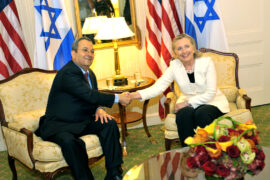After politely declining to shake hands with US President Joe Biden, Israeli entertainer Yuval Dayan has been barraged by a local media storm of criticism.
Her decision was motivated both by her commitment to the Jewish principle shmirat negia (guarding against physical contact between men and women outside of familial relationships), and by her personal desire to maintain a certain degree of privacy and autonomy in the face of the pressures of stardom.
Yet Israel’s media has lambasted her for embarrassing Biden, which some have noted is considered a grave transgression in Jewish law. Others have claimed that Dayan picks and chooses which laws to observe, since she often sings in front of men, which they point out is also forbidden by halakha.
By examining such claims more critically, however, it becomes clear that something other than concern for Dayan’s observance of Jewish law stands behind these critiques.
Regarding the claim that Dayan embarrassed Biden, nothing in the video footage of the event or in Biden’s public statements, indicate such an issue. In fact, before the trip, Biden’s staff publicized that the president would minimize all hand-shaking due to concerns of a renewed outbreak of the coronavirus. And Dayan herself reminded the event coordinators and the liaisons to Biden’s staff repeatedly that she would not be shaking his hand.
In light of this information, it can only be said that if Biden was embarrassed, he embarrassed himself.
Regarding the claims of “picking and choosing” – a common refrain among those who take exception with public shows of Jewish ritual and legal observance – there exists a fundamental lack of understanding that from the perspective of a Hebrew worldview, Torah obligations are a matter of constant choice – each decision brings one either closer to – or further away from – his or her true inner self. Thus for every Torah obligation that presents itself, one must choose whether to perform that mitzva and draw closer, or not perform it and create distance. Therefore, one’s self-alienating choice not to uphold one mitzva in no way means that their other, self-actualizing decisions should be thrown out the window.
It’s clear that our media that has hounded Dayan since the event has other motives.
The great concern for the honor of the US president, even at the expense of the bodily autonomy of an Israeli woman, indicates the media’s bias towards the West, and especially towards the American-led world order. Furthermore, it expresses a mortification at any public behavior – especially in front of the US president and international press – that presents Israel as a non-Western society that centers “primitive” Jewish values.
Such a willingness to throw Yuval Dayan under the bus in this manner is especially troubling in light of the various allegations against President Biden for inappropriately touching women and girls. In the eyes of Israel’s media, celebrities appear to be seen more as objects than as autonomous subjects, meant to serve the needs of the audience with no concern for their own needs and desires.
Such disregard was also seen a few weeks ago in the media storm around a campaign promoting taharat hamishpaḥa (purity of the family), the Jewish legal concept of a marriage consisting of physical separation and enhanced reattachment based on a woman’s cycle. After businesswoman Ruthy Leviev-Yelizarov launched a campaign in which various Israeli influencers discussed and promoted instituting taharat hamishpaḥa in their own relationships, celebrity gossip reporter Guy Pines came out with an investigative scoop that the influencers had been paid for their part in the campaign. Pines and other journalists were outraged that a woman loyal to a Jewish lifestyle was paying ostensibly non-observant celebrities to “missionize” the Israeli public.
Rather than interviewing the celebrities to hear why they chose to participate in the campaign and understand how they personally felt about taharat hamishpaḥa, Pines immediately ran to investigate how much money was given to whom, under the assumption that money was the sole motivating force behind the entire campaign.
“We did not know what each one would say in their videos,” responded Leviev-Yelizarov to her critics. “The payment is not for what they will say and talk about a particular topic, but for their time, for the days of filming they attended.”
“I do not usually reveal numbers of how much people are paid, but we paid them as is customary in these types of productions.”
In light of the media’s tendency to treat celebrities as commodities that can be bought and sold at the right price to advertise anything, it was inconceivable that the women felt any genuine interest or attachment to the mitzva. Some have even gone so far as to sue participants in the campaign for “false advertising” by conducting the campaign as an interview rather than a commercial advertisement.
At the root of both these cases lies the dual biases of the Israeli media’s misogyny and its role in the cultural conflict quietly raging in Israeli society between the forces of westernization and those defining a Jewish state as one that expresses Jewish identity and values. The direct targeting of these women for expressing interest in the ancient traditions that their people has maintained for thousands of years demonstrates that Israel’s media establishment expects female celebrities to adhere to the Western social norms that have dominated the country’s ruling class for decades, rather than to express an authentic connection to their own national heritage.
Therein lies the ultimate failure of the Israeli press. As a medium, it is inherently shallow and sensationalist. This contrasts starkly with the Jewish people’s ancient worldview and way of life, which can only be truly understood with patience and nuance, through years of study and centuries of transmission. A medium that constantly searches for the biggest scoop and the hottest take cannot and will not comprehend the depth of Israel’s values or traditions.
As long as Israeli society attempts to define itself through the lens of the press and the celebrities that it portrays, we cannot truly live our national story independent of foreign influences and the media’s push towards westernization. We need to find ourselves new role models, and maybe even become those role models ourselves. Rather than remaining “captive” audiences to trending stories, we need to live as proud characters in our own incredible national story.





